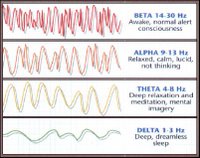
A neuroscientist claims he can unleash creativity by boosting low-frequency brainwaves, and he’s tested the theory on 100 students at the Royal College of Music.
The aim is to push the brain into a state of near-sleep to produce the slow rhythms, known as theta waves, associated with this state. It’s the kind of relaxed state in which ideas often come to you. It occurs naturally if, say, you are driving on a motorway and realize that you don’t remember the previous few minutes.
The sound of a babbling brook was played constantly during the training, and whenever she began to produce theta waves in the parietal lobe at the back of the brain, she would be “rewarded” with the sound of a musical gong. After several sessions, her theta waves were elevated through this almost unconscious controlling of brain activity. And (although longer-term studies are needed) it seems this increase in production of theta waves never reverses.
During treatment, sensors are placed on the scalp and ears to monitor the electrical activity in the brain – or brainwaves. High-frequency brainwaves occur when you are very alert and agitated, whereas lower frequency brainwaves dominate during relaxation or sleep. The sensors are hooked up to a computer, producing a graph that looks not unlike a heartbeat pattern.
John Gruzelier, an expert in the field of EEG (electroencephalogram, or the measurement of electrical activity in the brain) neurofeedback treatment and a psychology fellow at Goldsmiths University, has tested the treatment on more than 100 Royal College of Music students. Before and after the 10-session training programme, students gave a musical performance in front of a video camera. These were sent to expert musicians who rated the performances, unaware of whether each clip was filmed before or after the treatment. They also did not know which were “control” students who’d received no treatment. The results were consistent: students who had learnt to increase their theta brainwaves improved at least the equivalent of one musical grade, while there was no significant improvement in the control students.
Cool stuff. Of course, if you don't like all this new fangled technology stuff, you can get the same effects going old school.
Thomas Edison would solve problems by falling asleep with ball bearings clutched in his hands and metal plates positioned below. As his hands relaxed, he would be awakened by the clatter and would jot down the ideas that came to him in his drowsiness.
via
NerdShit (1320 words, estimated 5:17 mins reading time)






No comments:
Post a Comment
Note: Only a member of this blog may post a comment.